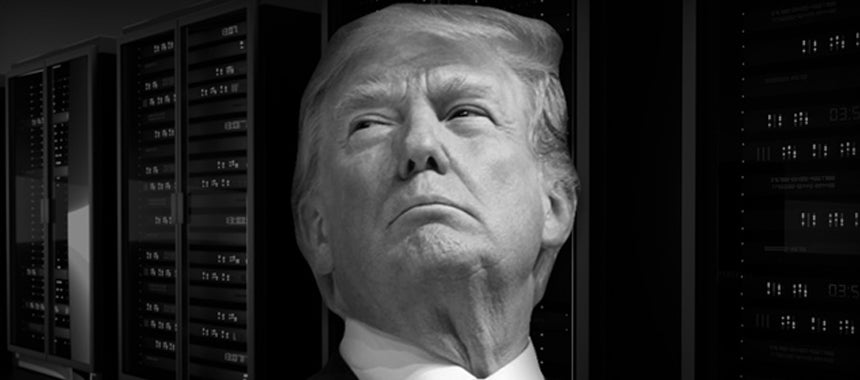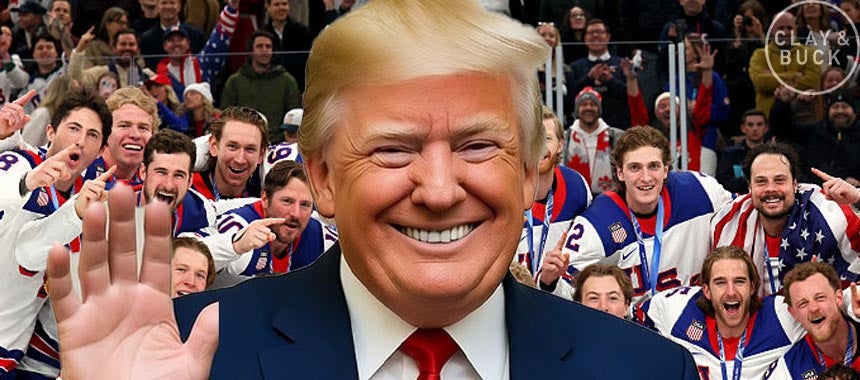A Huge Free Speech Fight: Trump Sues Big Tech CEOs
7 Jul 2021
CLAY: I am Clay Travis. He is Buck Sexton. And we have got an absolute bevy of show topics to dive into over the next three hours. I encourage you to go follow the show @ClayAndBuck on Twitter. You can follow me @ClayTravis and you can follow @BuckSexton on Twitter, Facebook, Instagram, wherever you may be across the social media universe.
And the social media universe now officially becoming under siege, Buck Sexton, as less than an hour ago Donald Trump announced that he is going to be suing Facebook, he is going to be suing Google, he is going to be suing Twitter and all of their CEOs as well as sundry other aspects associated with the banning of Trump from social media sites.
I believe, Buck Sexton, this is the biggest story in tech. I have been waiting for this to happen ever since the collusive decision to concertedly ban Donald Trump occurred across all tech platforms simultaneously back in January, and I didn’t know whether Trump himself was ever gonna file a lawsuit over this.
But I believe that this case or a version of this case will eventually be decided by the Supreme Court, and I believe it will be the most far-reaching and important decision as it pertains to Big Tech censorship and the power of Big Tech companies to decide who is on their platforms and who is not in this entire era of Big Tech dominance.
I think this is a significant step by Trump. Now, it will take years, I believe, potentially, for there to be a full resolution of this story. But I believe that our democracy… Everybody wants to talk about the insurrection. I believe the far bigger threat to our democracy than anything that went on January 6 is the response to January 6th, in particular in Big Tech.
And this is going to be a seminal moment when people look back — and some people may think I’m crazy on this. But I believe when people look back, that the biggest impact of the Trump presidency could end up being challenged to Big Tech over his banning. Do you think I’m crazy for this idea, Buck Sexton?
 BUCK: Well, no, because the most powerful media organizations in the world, without question, are the Silicon Valley giants, the oligarchs of the Bay Area.
BUCK: Well, no, because the most powerful media organizations in the world, without question, are the Silicon Valley giants, the oligarchs of the Bay Area.
CLAY: Yes.
BUCK: Google, Facebook, Twitter — you know, Amazon in a different way — they don’t even… Nothing else even comes close. I know we used to, in the nineties, the 2000s, conservatives talked about “the mainstream media,” and I agree with those who say, “No. Let’s call it ‘the corporate-Democrat media.’ Why give them that elevation?”
Well, they’re “mainstream.” That means others are out of the mainstream? But that was the term we used for what felt like a cabal of these different corporations — you know, ABC, CBS, NBC, and then CNN, MSNBC, all these different media entities on TV — and then obviously print and digital, the New York Times, Washington Post.
They had power to influence the national conversation. They were biased against conservatives. But now with Big Tech, this actually has given back the left-wing advantage, the Democrat advantage in communications that things like talk radio and the internet initially balanced out a bit and the rise of Fox News and other entities. Now they’ve been able to reestablish a kind of information dominance that we see with a former president — actually while he was president still —
CLAY: Yes.
BUCK: — being kicked off the most powerful communication platforms on the planet! I mean, you know, we have the FCC. There are things that you and I can’t say on radio. There are all kinds of his rules and restrictions about what can go on TV and political ads and what donors have to be… Well, that just came up the Supreme Court recently, but what donors have to be shown.
Why do we allow, why have we allowed the internet to be this monolith of left-wing control? Finally, I think now conservatives understand. Whether you’re on Twitter or Facebook or not doesn’t matter, because of the advantage this gives politically to the left. This is the central freedom of speech fight in America today, no question about it.
CLAY: And what’s so challenging about all this is, I think initially Mark Zuckerberg wanted to be a free speech guy. I really do. Because even in the discussion about Holocaust denialism, if you remember that discourse, he was pretty expansive in what he was allowing people to post on his platform.
But as we have seen the curtailment of debate in this country, a modern-day McCarthyism, the veil descend upon this country, much of it has played out on Twitter, on Facebook, on social media in particular. And to me, Buck, the decision to ban the New York Post was a crossing-the-Rubicon moment for tech in terms of not allowing that story to be disseminated.
And it directly led to the decision to ban the sitting president of the United States. And I talked, I testified in front of the House Judiciary Subcommittee investigating Big Tech back in March as a witness, and I was excited to be able to go there. And the analogy I drew, Buck, is, we are in a modern-day era where back in the day Rockefeller, J. P. Morgan, Carnegie, Stanford, all of these different barons of industry…
 As we became a national country with the railroads and with steel and with everything else, those men — and Ford, all those men — became wildly powerful and basically were able to pick presidents. And then we needed a robust antitrust law to start to break up the power of those individuals. That’s where we are right now, Buck, and what I would say…
As we became a national country with the railroads and with steel and with everything else, those men — and Ford, all those men — became wildly powerful and basically were able to pick presidents. And then we needed a robust antitrust law to start to break up the power of those individuals. That’s where we are right now, Buck, and what I would say…
And I understand there’s people out there listening to us right now say, “Well, just get off Twitter. Just get off Facebook. Just get off social media” because there is a conservative argument or go found your own version, which is another discussion I think we need to get into.
But most cogently, what we need is to acknowledge that if Facebook and Twitter and Instagram and all of YouTube — all these different platforms — have the ability to ban the sitting president of the United States. It is a clarion call for those of you who care about robust debate and the First Amendment at all to fight the good fight.
And I believe this is the fight that Donald Trump should be fighting. I applaud him for filing these lawsuits. And, Buck, some people are gonna listen to me and they’re gonna say I’m crazy. I believe — ’cause immediately you know what the New York Times is gonna say, and you know what the Washington Post and MSNBC and CNN are gonna say.
They’re gonna dismiss this lawsuit. I believe that this lawsuit will go to the very foundation of Big Tech power, and I think before all is said and done — and it will take years, but I think this will go all the way to the Supreme Court, and there will be a ruling.
Which has to take into account the town square elements, the public utility arguments about whether or not we can see a banning of Donald Trump take place like we have seen so far. I applaud him for filing the lawsuit, and I believe this is going to be a historic day when we look back in terms of its overall impact in the years to come.
BUCK: There is a degree of urgency to this, though, as well. And obviously if it just goes to the normal course of the legal system, it will take a very, very long time.
CLAY: Yes.
BUCK: And I also think everyone should understand, we gotta know our enemy, so to speak, our adversary in this legal fight. Endless resources. Endless resources. I mean, you’re talking about a company that can spend money, not just on the best lawyers, but as many lawyers and as many procedural delays and tactics as possible.
You know, going to legal war with Google and Facebook and these other companies isn’t gonna be an easy task for anyone. I think the Trump folks understand that, but just to put everyone’s perspective in the right place on it. But then remember that we have a midterm election in the next year, coming up next year in the cycle. We have President Trump already out there in the campaign trail.
There are going to be challenges now. People are gonna start to say, “Well, hold on a second. How is it that you could have the former president — and for many still the de facto leader of the Republican Party — not allowed access to the same public square?”
 CLAY: Yes.
CLAY: Yes.
BUCK: And if we’re not willing to treat these companies like utilities or start to force utility-like regulations on them, people are saying the phone company, for example, or whatever the case may be, then breaking them up as monopolies also has to happen. But there’s another big challenge here. I mean, I’m with you that it’s great that Trump staying this action and it forces a national conversation. There are a lot of Republicans — ’cause I remember this in the last two years of the Trump administration — who talked tough on this issue.
And then you find out that they’ve actually taken some really nice money. It’s actually Alphabet that owns Google, the company that owns them. But they’ve taken campaign donations or, you know, they have some business interest or some future business interest even.
I mean, the ability of Big Tech not only to influence the national political conversation, but also to act as oligarchs in previous societies throughout history where they can induce, they can seduce, they can get people to come over to their side who are supposed to be the champions of free speech and conservative values.
So I just want to make sure that everyone watches which members of Congress — ’cause there are Republicans, I can tell you right now, who will surprise you as sellouts on this. ‘Cause you want to talk about elites, you want to talk about people that can throw really good things your way if they choose to?
The heads of these tech companies are… I mean, really, they’re like the new… They’re like the digital royals. I mean, they operate in this sphere of wealth and influence and power that’s really hard to comprehend. I mean, they’re almost like nation states unto themselves.
CLAY: You’re 100% right on all of that, and that is why they need to be attacked and broken up — and look, I’m a capitalist. I believe in success in using markets to drive your business as large as it can possibly go. But I also know people want to talk all the time about the foundations of democracy.
You hit on something that I think has to be unpacked to a large extent. In 2022 and 2024, imagine… Let’s say that Donald Trump is the nominee in 2024. Imagine if there is a digital army of Democrats attacking Donald Trump all day long on social media and he’s not allowed to fire back. Your analogy, I think, is a good one: Public utilities and town square.
I want to discuss that in greater detail when we come back because I do think it’s massively significant. We don’t really understand the technology that we have wrought. It’s Frankenstein-like in the way that social media has grown and Big Tech has grown, and I think we’re just starting to realize how many of these issues have metastasized into something massive.
BREAK TRANSCRIPT
PRESIDENT TRUMP: Today, in conjunction with the America First Policy Institute, I’m filing — as the lead class representative — a major class action lawsuit against the Big Tech giants, including Facebook, Google, and Twitter, as well as their CEOs, Mark Zuckerberg, Sundar Pichai, and Jack Dorsey. Three real nice guys.
 CROWD: (applause)
CROWD: (applause)
BUCK: Welcome back to the Clay Travis & Buck Sexton Show. There you had the president announcing — and this is, Buck, by the way. You had the president announcing this lawsuit that Clay and I are talking about. And, Clay, I just want to point out to everybody that it’s not even just the banning that we need to be very aware of.
I mean, that’s obviously a clear manifestation of the political bias that we’re all talking about, but it’s also the use of back-end algorithms to elevate and suppress, shadow banning, the way that for all of covid — and I want to remind everybody.
During the covid pandemic, they suppressed news. That was the first time that social media was openly suppressing. They had been suppressing conservatives for years and they kept saying disingenuously, “Oh, it was an accident,” right? You’ve probably seen this when they have done it.
CLAY: Yes.
BUCK: “Oh, we didn’t mean to ban that.” It just so happened to be conservatives every time. They did it openly under the health emergency rubric with covid, including on things like the lab-leak theory where they were just flatly wrong. So they suppressed on the basis of public health things that turned out to be true and elevated things that turned out to be likely untrue.
Now you just had… There was barely a whisper about this, Clay. Facebook is doing this anti-extremism warning testing. Have you seen this? This is in recent days, where they’ll tell you, ‘We think you or someone you know may have been exposed to extremist thought,” and I’m like —
CLAY: (chuckles)
BUCK: “Well, at what point is ‘extremist thought’ anti-CRT? At what point is ‘extremist thought’ teaching about Marxism and totalitarianism and the hundreds of millions murdered and enslaved in living memory by those ideologies?” That’s what I want to know when we’re talking about Big Tech.
CLAY: Yeah, and to your point, Buck, the algorithms drive discussion in a fundamentally artificial way because the algorithms have been designed to favor left-wing causes. And then the media, which already overwhelmingly trends left-wing, looks at what stories are populated on social media as a reflection of what people in the real world are talking about.
And let me try to make an analogy here that I think is significant that people need to understand, and this is me thinking about it from a legal perspective, ’cause I think this class action lawsuit that Donald Trump has filed will eventually end up at the Supreme Court — I really do — over trying to figure out how to draw the line as it pertains to censorship, Big Tech banning, and all of those things.
There is a great example, historically, of the power that Big Tech has. But there is an analogy based on… If people remember, back in the day — it’s not as common now — there used to be company-owned towns. So if you had a big factory, the company might well — on property that it owned — build housing that people could live on inside of that universe.
You did not lose your right to free speech because you happened to live in a company-owned town. It was a necessity of life in order to work at these factories that you might not be able to afford, Buck Sexton, any other place where you could live. And so, the Supreme Court, in a series of cases had to analyze First Amendment there.
BREAK TRANSCRIPT
CLAY: We are rolling through massive news that I would say could linger and continue to resonate for years to come. Donald Trump — in what I think is the most important battle of all the battles that he could possibly fight — has filed a lawsuit against Facebook, Twitter, Google for the bannings that have occurred on social networking sites Twitter, Facebook, and YouTube, suing also all of the individual CEOs.
Buck Sexton, this could also be big because getting those tech CEOs under oath and making them discuss all of the decision-making surrounding the decision to ban Donald Trump could also further illuminate anti-conservative bias inside of these companies. I love everything about this lawsuit.
BUCK: I just want to say, we have to remember that Trump, with Twitter, took a favorite tool of the left and the Democrats and used it back against them in a way that they weren’t expecting. One of the great things of the Trump era — honestly, some of the most genius aspects of his political maneuvering — had to do with a kind of jiujitsu.
He would take what they were doing and throw it back at them. A perfect example of this is a lot of folks forget now, because he’s so successful, he did it with “fake news.” Fake news initially was something that the corporate Democrat media was calling out because of Russian bots on Facebook —
CLAY: Yeah.
BUCK: — and that the Trump voters were believing the fake news. And then Trump said, “You know what? You, the corporate media, are the fake news.” And they went, you know, apoplectic! They freaked out about that. That, of course, upset them to no end because they’re both hypersensitive and very ego driven. That’s always true of the corporate journos.
But on this, on Twitter, all of a sudden the president created a work-around to his, you know, roughly — I don’t know the final number, but it was something like — 80 million followers and no longer had to go through the filter of some, you know, bull crap, you know, corporate media interview, some sit-down with one of the broadcast stations where they cut the interview; they edited it, maybe.
CLAY: Yes.
BUCK: They presented it a certain way they asked the questions. Trump being able to take the question directly to his base was something that they had to shut down. And, Clay, the ol’ insurrection and the election and all this stuff was the excuse, because not only did they feel like Trump had taken their toy away; they had to make sure that in the early months of the Biden presidency you wouldn’t have this massive Trumpian megaphone blasting Sleepy Joe.
I mean, look at the Biden administration as it is right now without Trump being able to reach all those people. I mean, just think. Can you imagine the jokes, imagine the hashtags that Trump would get started about Biden? The one thing these leftist authoritarians can never, can never tolerate is mockery, and that’s what Trump went at them with too.
CLAY: No doubt. And to your point, social media is a natural evolution in the twentieth and into the twenty-first century. Franklin Roosevelt, obviously, with his fireside chats. He used radio much to his benefit, a new communication device to reach directly into homes, which is what we are still using today a hundred years later.
Memorably, John F. Kennedy against Richard Nixon in the first televised presidential debate, people who listened to that debate believed Nixon had won. People who watched believed Kennedy had won. Television — and I think mastered in many ways by Ronald Reagan — changed the way that the president communicated with the American public yet again.
And now social media. And I think Trump’s mastery in many ways intuitively in his nature to use social media to reach his audience was an incredible value proposition that he brought to bear in the world of politics and — as you said, Buck — cut out the middleman and went directly to his audience, as opposed to relying on other forms of corporate media to disseminate his message, which may have been done so in an inaccurate fashion.
Now, the challenge obviously with Trump and social media in general is, there’s a lot of people out there listening to us right now that wanted The Good Trump on social media without The Bad Trump on social media. And I do think his usage of social media was not as adroit and tactically as it could have been. But what do you expect from a 75-year-old guy? I think there are younger versions of political impressionists who are gonna do a better job of that.
BUCK: Do you remember whenever Trump…? I’m sure you got the Trump retweets sometimes and I remember it happened to me. The only way I would know is because all of a sudden all of my in boxes would be filled with, like, C-list actors cursing at me.
CLAY: (laughing)
BUCK: All of a sudden, you know, out of the woodwork, the lunatic leftists, they’ll descend on you like a plague of locusts. They’ll come after you because a Trump retweet means they’re all gonna come at you.
CLAY: Yes.
BUCK: Because every journalist watched. You could not have been up on the news cycle during the Trump presidency — you couldn’t have been following it closely enough if you worked in politics — without following that Twitter account. That was the kind of power that he had there. He made Twitter more relevant as a company than it would otherwise have been, which I think is also interesting when you look at all this. But here. There’s a little more from his announcement today, the former president talking about it. Play it.
 PRESIDENT TRUMP: We’re asking the U.S. District Court for the Southern District of Florida to order an immediate halt to social media companies’ illegal, shameful censorship of the American people — and that’s exactly what they are doing. We’re demanding an end to the shadow banning, a stop to the silencing, and a stop to the blacklisting, banishing, and canceling that you know so well. Our case will prove this censorship is unlawful, it’s unconstitutional, and it’s completely un-American. We all know that. We all know that very, very well.
PRESIDENT TRUMP: We’re asking the U.S. District Court for the Southern District of Florida to order an immediate halt to social media companies’ illegal, shameful censorship of the American people — and that’s exactly what they are doing. We’re demanding an end to the shadow banning, a stop to the silencing, and a stop to the blacklisting, banishing, and canceling that you know so well. Our case will prove this censorship is unlawful, it’s unconstitutional, and it’s completely un-American. We all know that. We all know that very, very well.
BUCK: Clay, let’s assume for a second that it would be possible to get a judge to give injunctive relief, and one of the big problems under the Trump years was that all it took was one lunatic activist judge to do a universal injunction and to effectively block and nullify temporarily a Trump administration initiative. That was happening over and over again.
You know, the Ninth Circus would do the crazy stuff that they do. Even lower courts would do that. Clay, if we get injunctive relief here, if Trump’s lawsuit — which he’s clearly asking, he’s laying out some of the things he’s asking for — what would that even look like? I think this is one of the problems we have, right? Because you’re trying to enforce a speech standard of neutrality. How does that really….? How does that look? How does that really go?
CLAY: It’s a fascinating question. And that’s why I think this ultimately, Buck, goes all the way to the Supreme Court, because I think the Supreme Court, in a social media and digital era — and you’re already seeing people on the court. Clarence Thomas has done it for sure.
And Silberman, I believe it was, in the D.C. district court wrote an incredibly interesting piece basically saying, “Hey, we need to overturn New York Times v. Sullivan,” and basically our First Amendment jurisprudence doesn’t fit the current tech industry in which we are in. I do think it’s significant to your point, Buck, he’s filing this lawsuit in a federal district court in South Florida.
I don’t know which judge will end up with it, but think: Where was Trump’s strongest market in terms of his growth in the 2020 elections? South Florida. Trump flipped, effectively, in Miami-Dade County so many voters in 2016 who had gone for Hillary Clinton. The Cuban, the Venezuelan element, they all started going for Trump.
Now, if you could get a district court judge to look at this and immediately rule that Trump is being harmed by not being able to reach his audience — that also Facebook and Twitter are violating the terms (and YouTube) of their universe under the existing guidelines — this could get really interesting in a hurry.
Because a federal district court judge would have the ability, in theory, if they bought into this case, to argue that Trump had the ability to get access back to his Twitter account. Where is that Twitter account being even saved, for instance, Buck? Are those 85 million Twitter followers frozen in amber in the servers at Twitter in I don’t know. Can they flip a switch and suddenly it’s back to normal?
BUCK: And let’s also remember that there were lawsuits brought against Trump for blocking people.
CLAY: Yes! Oh, yes. That’s what I’m saying.
BUCK: And there were judges who said —
CLAY: You can’t do that.
BUCK: You are not allowed. This is a private platform, but he’s a public figure on this private platform, and you are not allowed to be blocked. So they’ve already set a precedent —
 CLAY: Precedent.
CLAY: Precedent.
BUCK: — here for a judge weighing in and telling Twitter — you know, telling an individual using Twitter — what you can and can’t do. So all it takes is one judge here, and it would be a fascinating situation. I just have concerns about… Look, reinstatement would be the injunctive relief they want.
CLAY: Yes.
BUCK: I get that. But what does it mean? You know, how do we actually have this going forward other than a handshake agreement where you won’t show bias? What’s the legal…? You know, you start to get into what would effectively be anti-discrimination language for political belief. Right? We use this in other places, public accommodations and so on and so forth. What about for political beliefs? That’s something that some states have already started to consider.
CLAY: Well, and remember, Florida has passed a law, Ron DeSantis did —
BUCK: He did. Yeah.
CLAY: — banning the behavior that has occurred here with Trump. So this is… I mean, there are going to be a lot of people in the mainstream, corporate-left media who are gonna say, “Oh, this lawsuit is dead on arrival.” I’m telling you the opposite. I’m telling you that a lawsuit like this and some version of it is going to go all the way to the Supreme Court and body blow, I believe, in a big way all of the power at Big Tech.
Recent Stories
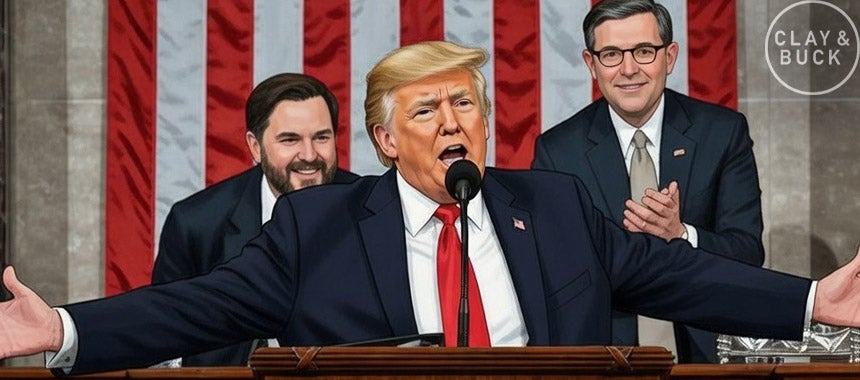
Clay & Buck Break Down Trump’s SOTU
C&B cover every angle of the night -- including the special brand of crazy Democrats bring to every Trump event.
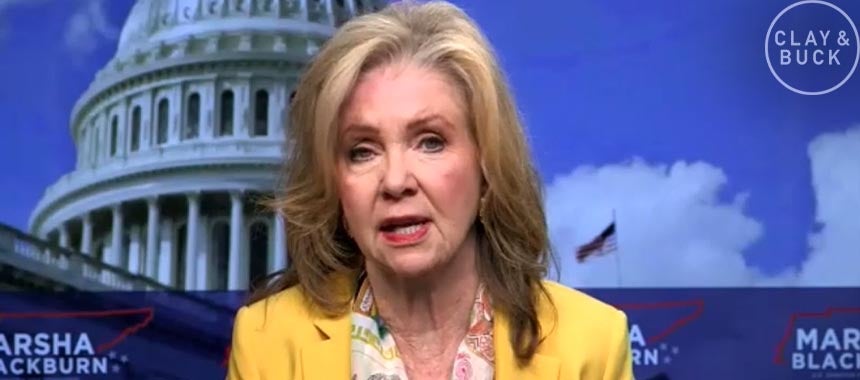
Marsha Blackburn Slams SOTU Dems: "Their Behavior Was Appalling"
The Tennessee senator reacts to the state of the union speech and more.
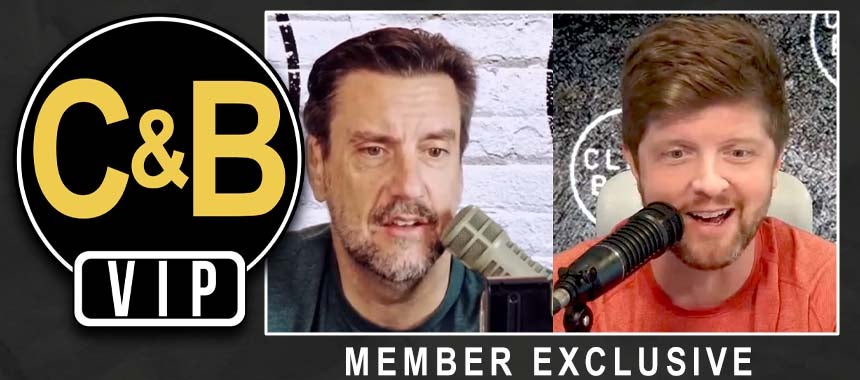
VIP Video: The Democrats Are Crazy
One of President Trump's best lines of the night is undeniably true.
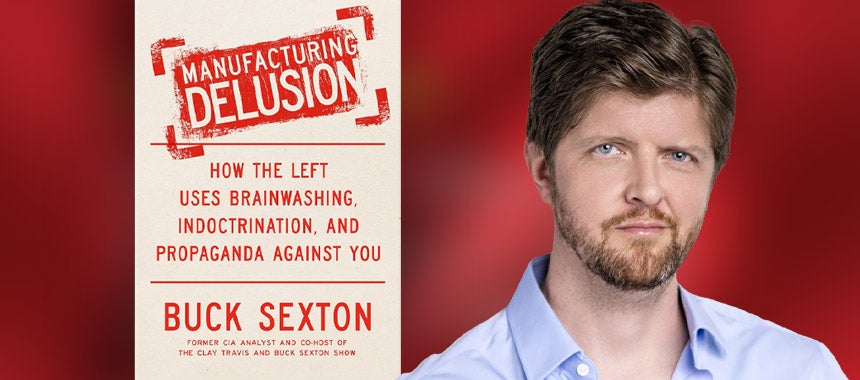
Manufacturing Delusion Is On Sale Now!
Buck's book is one of the most popular on the charts. Get it now.


